I started reading Charles Bukowski (1920-1994) when I was 15 years old: first Post Office, then Women, Factotum and his masterpiece Ham on Rye, and then the stories: Erections, Ejaculations, Exhibitions, and General Tales of Ordinary Madness (turned into a great film by Marco Ferreri in 1981) and South of No North. But it was the poetry that got me truly hooked on Bukowski, and most of all I loved the poetry readings. I still have some of the cassettes I bought many years ago: my favorite is Poems & Insults!: Live Reading at City Lights Poets Theater, San Francisco (september 1973).
That voice: This is Charles Bukowski...
I kept (re)reading Bukowski, but suddenly, some years after his death, I got the opportunity to publish his last novel, Pulp, at Vassallucci, the publishing house that I founded with Lex Spaans, back in 1995. His agent, Carl Weissner, who translated Buk into German and handled most of his translation rights, offered us the chance, and we jumped on it.
We published Pulp in 1997 and it sold really well. We bottled special Bukowski beers for the launch (at Patronaat, in Haarlem) & hosted a Bukowski Dinner (we served chicken with mashed apples aka "appelmoes" + sixpacks of beers) alongside with it.

Almost twenty years later I got the chance to publish all of Bukowski's books in Holland, and this time we released five books at the same time, beautifully designed by our friends from Dog & Pony, and launched the books at yet another Bukowski Party, at Pakhuis de Zwijger in Amsterdam. Of course we preceded it with another "Bukowski Dinner", lots of writers and musicians performed live on stage, with rapper Sticks - who is wellknown for his love for Bukowski - killing the party, which itself mentioned in opening lines of the big review in NRC Handelsblad.
Nice one.

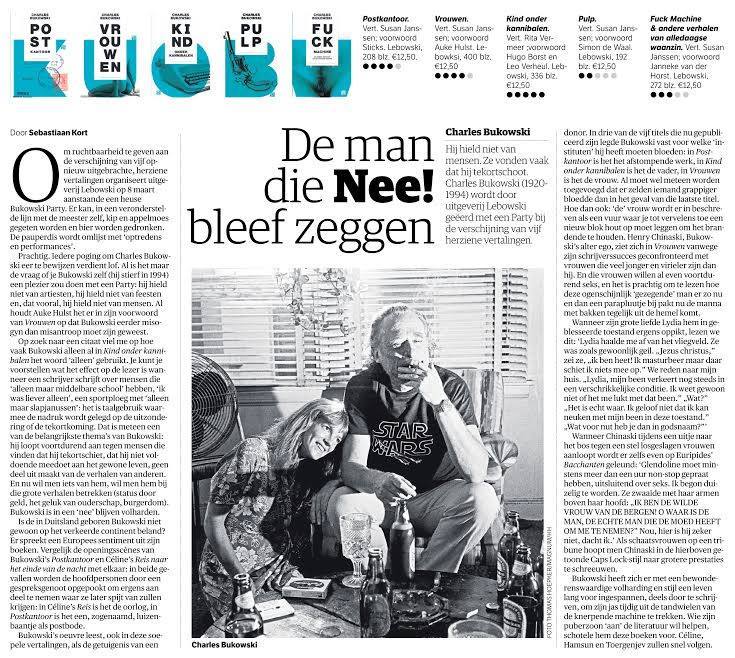
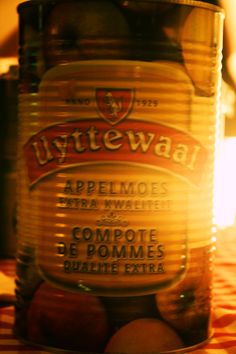



On august 27th, Bukowski on Writing will be published by Ecco Press, who are currently Charles Bukowski's publisher in the USA (except for some titles that are in print at City Lights). They previously published Bukowski on Cats and will publish, in 2016, Bukowski on Love...
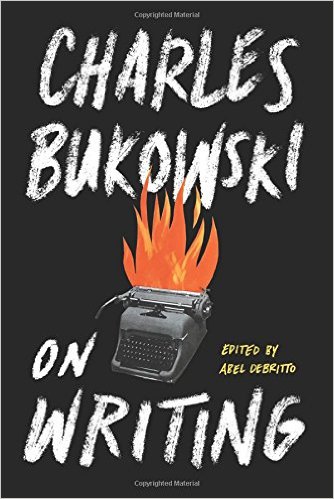
Today, august 16th, it is Buk's birthday, a good moment to celebrate his rules and insights on what it takes to be a writer.
Enjoy.
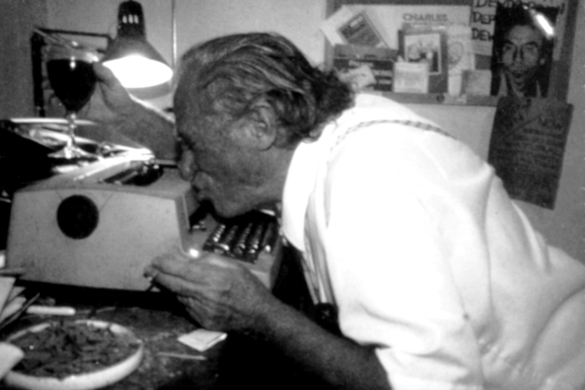
1. Give yourself time to mature as a writer.
“Well, I’m 34 now. If I don’t make it by the time I’m 60, I’m just going to give myself 10 more years.”
2. Let your creativity find whatever outlet it needs.
“Now print my occasionals out by hand and point them up with drawings (like any other madman). Sometimes I just throw the stories away and hang the drawings up in the bathroom (sometimes on the roller).”
3. Treat the submission of your work like it’s a job.
“I remember when I used to write and send [Story Magazine] fifteen or twenty or more stories a month, and later, three or four or five—and mostly, at least, one a week. From New Orleans and Frisco and Miami and L.A. and Philly and St. Louis and Atlanta and Greenwich Village and Houston and everyplace else.”
4 Sometimes you have to write a lot of bad stuff to get to the good stuff.
“I’m not one to look back on wanton waste as complete loss—there’s music in everything, even defeat.”
5. It’s ok to rely on magic.
“Went back to night school there about a year ago and took some art courses, commercial and otherwise but then too, they moved too slow for me and wanted too much obeisance. I have no definite talent or trade, and how I stay alive is largely a matter of magic.”
6. Don’t worry about grammar.
“Thank you for lessening the blow on my weakness of grammar by mentioning that some of your college friends have trouble with sentence structure. I think some writers do suffer this fate mainly because at heart they are rebellious and the rules of grammar like many of the other rules of our world call for a herding in and a confirmation that the natural writer instinctively abhors.”
7. Don’t overwork your writing. Often, the first is best.
“I have not worked out my poems with a careful will, falling rather on haphazard and blind formulation of wordage, a more flowing concept, in a hope for a more new and lively path.”
8. Work all the jobs.
“Worked in slaughterhouse, dog biscuit factory, Di Pinna’s of Miami beach, copy boy on the New Orleans’ Item, blood bank in Frisco, hung posters in New York subways 40 feet below the sky drunk hopping beautiful golden third rails, cotton in Berdo, tomatoes; shipping clerk, truck driver, horseplayer ordinary, holder down of barstools throughout a dull alarmclock nation, supported by shackjob whores; foreman for American newsco., New York, Sears-Roebuck stock boy, gas station attendant, mailman…”
9. Don’t get an MFA.
“Your criticism correct: poem submitted was loose, sloppy, repetitive, but here’s the kernel: I cannot WORK at a poem. Too many poets work too consciously at their stuff and when you see their work in print, they seem to be saying… see here, old man, just look at this POEM. I might even say that a poem should not be a poem, but more a chunk of something that happens to come out right. I do not believe in technique or schools.”
10. Really, don’t get an MFA.
“Also got your new card today, must agree with you that one can talk poetry away and your life away, and I get more out of being around people—if I have to—who never heard of Dylan or Shakey or Proust or Bach or Picasso or Remb. or color wheels, or what. I know a couple of fighters (one with 8 win streak going), a horseplayer or two, a few whores, x-whores, and the alcoholics; but poets are bad on the digestion and sensibility, and I could make it stronger, but then they are probably better than I make them, and there is a lot of wrong in me.”
11. Writing is maybe like fucking.
“Writing is like most writers think fucking is: just when they start thinking they are doing it pretty good they stop doing it altogether.”
12. There are no bad ideas.
“Idea for literary journal: The Toilet Paper Review… which would be typewritten by me on toilet paper (our motto being, “We Give a Shit!”) would use some carbons in typing and then would glue toilet paper to regular paper and make original cover drawing for each mag sent out.”
13. Avoid excessive dialogue.
“Either fuck it right it write it paint it. 2 guys talking don’t do much for me.”
14. You can’t write poetry with a beard.
“His beard stands out and tends to save him but you can’t write poetry with a beard.”
15. Be honest with your fellow writers.
“Ah, shit, Carol, these are not very good. I am sitting here drunk + it is raining, has been for days, and these are not very good. […] “Edges” still the best of these. But your last line terrible. 19th-century French-literary Romanticism. What the fuck. You know this. I am going to put out a good magazine. And doing so sometimes means being cruel and being cruel sometimes means being right.”
16. Rejection is good for the soul.
“Of course, shit, hope you can find a poem or two in these; if not return those you cannot use, or the works. rejection is good for the soul. my soul is now a mule.”
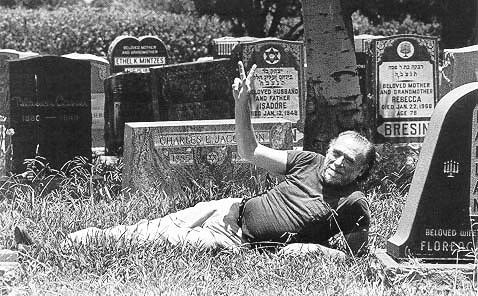
Big up for the Literary Hub for allowing me use the sixteen rules of advice.